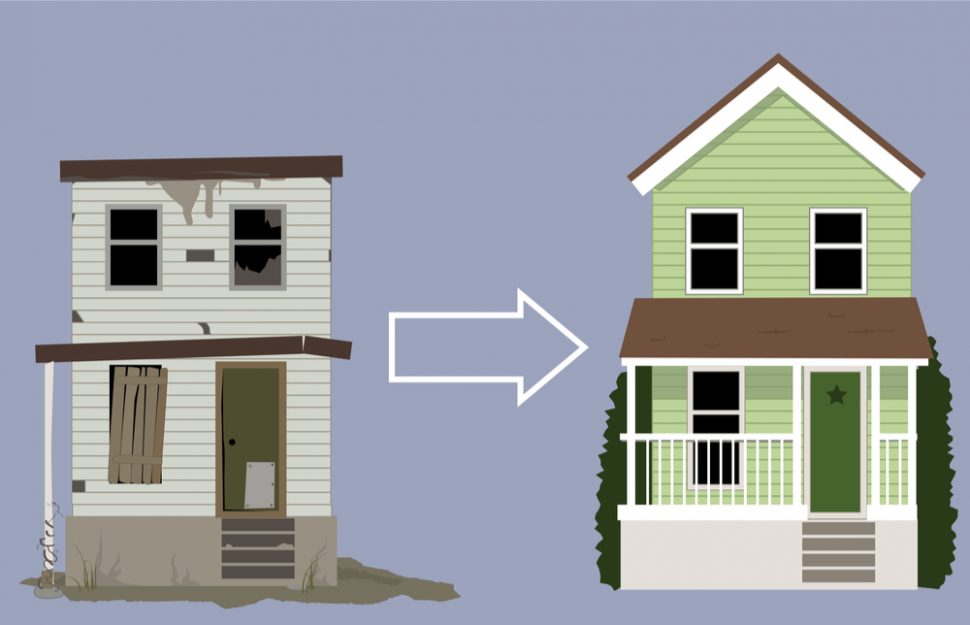What Happens When a Real Estate Rehabber Dies?
Uncomfortable thought, I know, but stay with me a minute. Most rehabbers I know work, live and act as if they’re never going to die. In and out of deals in six months and on to the next one. Lenders get paid, contractors get the job done. But what if it all ended suddenly, and permanently?
Here’s what happens (from a legal perspective)…
Our rehabber, we’ll call him Flip, has a few projects in the works two in the middle of construction, one is done and on the market to be sold, and Flip has three more under contract to purchase. He’s a one-man band – he has people working for him, but he’s the sole owner of his business. One day Flip drops dead.

D-Day Plus 1 Week
Flip’s contractors, in shock, depressed continue the work they were paid to do, and take the pending projects as far as they can based on Flip’s instructions, but they quickly come to a stopping point, they don’t know what to do next, and there’s no money to do it anyway. The contractors leave the pending projects – unfinished. Calls from realtors and other prospects to Flip go unanswered. Flip’s family is mourning, dealing with funeral arrangements etc.
D-Day Plus 2 Weeks
Flip’s family is starting to go through his business affairs. Since he was a one-man band and handled the major aspects of the business himself, they’re having a hell of a job figuring it all out. One of Flip’s brothers steps forward to take the lead, but what he can do is limited. He has no authority to sign checks or do anything else on behalf of Flip. Flip had no Will, so his family hires a lawyer to make application to get someone qualified to handle the matters of his estate.
D-Day Plus 1 Month
Flip’s lenders start calling. Interest payments didn’t arrive this month. As word gets out about what happened, each lender deals with it in their own way. Some consult with attorneys, others wait to hear what the family will do. All of them are worried. These were “can’t lose” investments backed by property and a key man, but now their key man is gone and the property is unfinished. The unsecured lenders have the most to lose.
You get the point. It’s a mess. Not for the rehabber, obviously, but for the people he left behind. How do you prevent this from happening to your people?
Here are some ideas…
1. Get Systems in Place & Write Them Down
Even if you’re a one-man operation, writing down how you do your day-to-day business can make it a lot easier for someone else to keep things going long enough to properly exit your deals.
2. Get Life Insurance
Life insurance in amounts sufficient to make sure your lenders get paid will help take the pressure off, and give those responsible for winding down your deals and estate time to do it right. Proceeds could also be used to make an otherwise losing deal, profitable, which will help keep those in charge of your estate fully incentivized and engaged in making sure that promises you made when you were alive are kept.
3. Give Someone You Trust Signing Authority on Your Accounts
It could take months or more to have a court qualify a loved one to act on behalf of your estate. In the meantime, your money is inaccessible, and before too long the contractors who were finishing your projects will have moved on, and lenders may panic. Keeping the funds flowing could enable the guys you put in place to complete the work to finish the project.
Conclusion
These are just a few ways to plan ahead to make things right. If you’d like to hear more, give us a call and we’d be happy to help. We’ve helped many investors put contingency plans in place.
This stuff is not just to handle the “what ifs.” Being able to demonstrate to those lenders and others that you work with that this is something you’ve thought about and protect- ed them from will put you in a league of your own in terms of credibility and professional- ism. Then, when you’re offering a lender a “can’t lose” deal, you’ll mean it.
View Full Document

